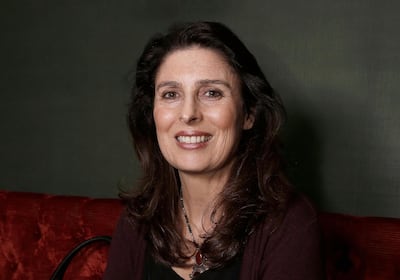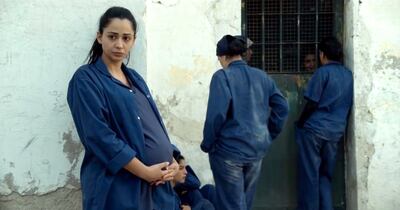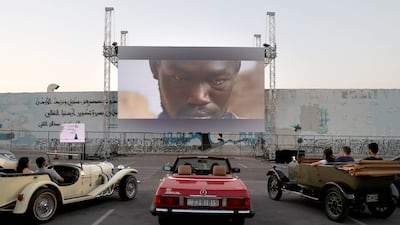The Amman International Film Festival has concluded its fourth run.
Over the past week, the festival presented 56 films from 19 countries. These included feature narratives, documentaries and short titles.
The films were all screening in Jordan for the first time, with some even marking their world premiere. Screenings were held across several locations in the Jordanian capital, including at a drive-in cinema, Taj Cinemas, Rainbow Theatre and Royal Film Commission.
The festival also included panel discussions, as well as masterclasses and pitching platforms that aimed to support new and established filmmakers with upcoming projects.
Here are a few of the highlights from the fourth year of the festival.
Octave
The first of the highlights is not film-related but still kicked off the festival with a bang.
Jordanian folk-rock band Octave gave an electrifying performance in the opening ceremony on August 15. The five-piece band played variations of renowned folk songs from the region. With overdriven electric guitars, rousing drums, bass and the band’s characteristic use of traditional Jordanian woodwind instruments, Octave made sure the festival began with something to talk about.
Lyd
While most film screenings at the festival were memorable in their own right, the world premiere of Lyd was particularly touching. Directed by Rami Younis and Sarah Ema Friedland, the film puts a spotlight on Lyd. A city with a 5,000-year history, Lyd was once a Palestinian capital and in the early 20th century was a thriving metropolis.
Lyd highlights the city's rich history while also featuring the bloodier aspects of its past, namely the massacres and expulsions of Palestinians by Israeli forces in 1948, after which the state of Israel was created and the city became known as Lod. The documentary interviews survivors of the Nakba, Palestinians living in Lyd, as well as those in exile.
The film juxtaposes the real-life footage with animation that treads into sci-fi territory, imagining what Lyd could have been like if not for the bloody events of the Nakba.
Among those present in the sold-out premiere screenings were Palestinians with roots in Lyd. In the Q&A session that followed the two screenings, many voiced their appreciation of the documentary and shared their own stories of Lyd in testimonies that had the screening hall thundering with applause.
Conversation with Mai Masri
Every year, the Amman International Film Festival holds the First and Latest, a conversation with an established Arab filmmaker that follows the trajectory of their career.
For its fourth run, the festival featured celebrated Palestinian director and producer Mai Masri. In an event at the Royal Film Commission on Monday, Masri spoke about her beginnings in film, charting her four-decade-strong career.
Her entry into the world of film began when she attended a film theory class in California in the mid-1970s, having travelled from Beirut as it became engulfed in a civil war that would last for 15 years. After pursuing several filmmaking and cinema courses in the US, she travelled back to Beirut in 1981 and soon began making films.

Masri made her first films in collaboration with her husband Jean Chamoun. Their debut Under the Rubble (1983) was a documentary that gave an unflinching glimpse of the 1982 Israeli invasion of Lebanon. The film won the Special Jury Award at the Valencia Film Festival. The couple worked on several acclaimed documentaries, including Suspended Dreams (1992).
Though her film studies helped inform her understanding of the technical aspects of cinema, she said it wasn’t until she began filming on the ground that she really learnt the nuances of the craft.
“It outs everything you learn in practice,” she said. “It was a challenge. It wasn’t just directing but also shooting. At the time, there weren’t really any women shooting film. There wasn’t respect for the idea that a woman could hold up a camera, especially in a war.”

Masri spoke about how she was drawn to highlighting the perspectives of women and children in Lebanon and Palestine, whether in fiction or documentary. Her 1998 film Children of Shatila focuses on the lives of two children growing up in Beirut's Palestinian Shatila refugee camp. The camp was established in 1949 and was the site of a massacre in 1982, where thousands were killed by the Israeli-backed Phalange militia. Masri’s 2015 film 3000 Nights, on the other hand, tells the story of a young schoolteacher who gives birth to her son in an Israeli prison, fighting to protect him and survive.
“This story is inspired by a real-life story of a woman I met in Nablus during the Intifada,” Masri said. “She was previously imprisoned. She gave birth to her son in prison and named him Palestine. She told me her story 20 years before I made the film, but it stayed with me, how she raised her child in the prison among prisoners. So when it came time to make a narrative film, I knew I had to make it based on this. I met dozens of women who were imprisoned, as well as their children.”
AFID Awards
The Amman Film Industry Days is held every year on the sidelines of the festival. It includes masterclass, seminars and a pitching platform. Several prizes are granted to filmmakers with the aim of bolstering upcoming works.
The ceremony for this year’s AFID Awards took place on Monday. Projects that received support included Madness and Honey Days by Iraqi filmmaker Ahmed Yassin Al Daradji, the director behind Hanging Gardens; Let’s Play Soldiers by Yemeni-Russian journalist and filmmaker Mariam Al-Dhubhani; Amara by Lebanese filmmaker Michelle Keserwany; and The Silence of the Plain by Lebanese filmmaker Zeina Sfeir.
The AFID award ceremony was a precursor to the AIFF's concluding event on Tuesday, which honoured the films that won in the festival's competition aspect.


